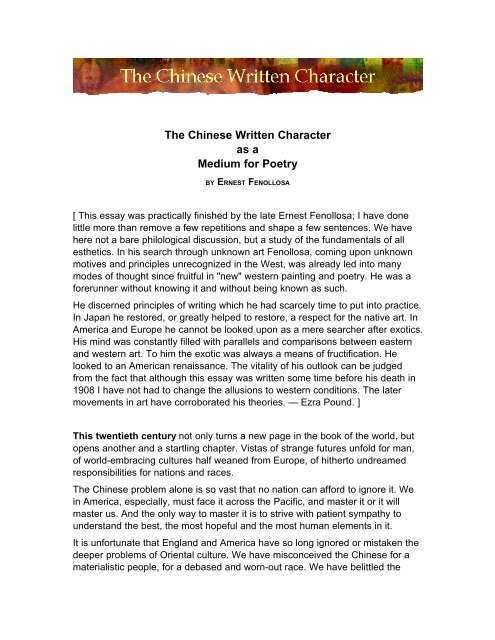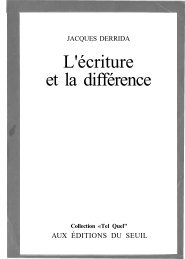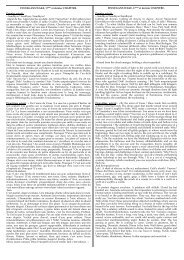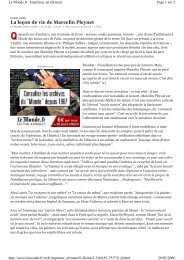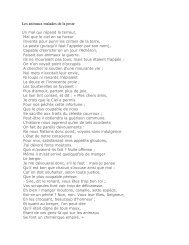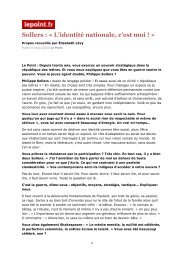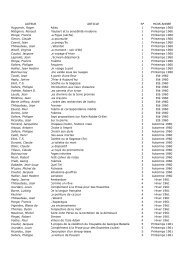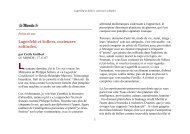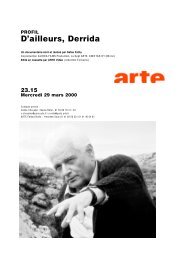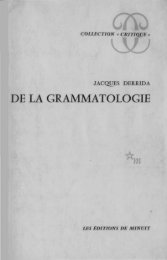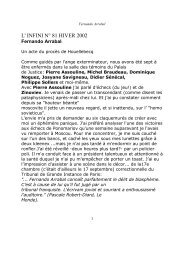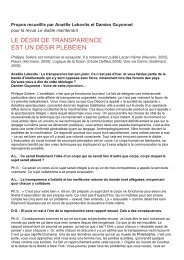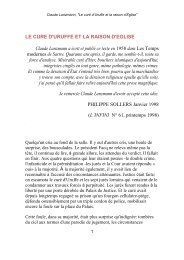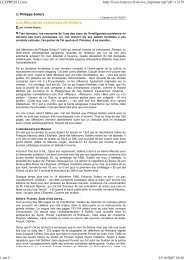The Chinese Written Character as a Medium for Poetry
The Chinese Written Character as a Medium for Poetry
The Chinese Written Character as a Medium for Poetry
Create successful ePaper yourself
Turn your PDF publications into a flip-book with our unique Google optimized e-Paper software.
<strong>The</strong> <strong>Chinese</strong> <strong>Written</strong> <strong>Character</strong><strong>as</strong> a<strong>Medium</strong> <strong>for</strong> <strong>Poetry</strong>BY ERNEST FENOLLOSA[ This essay w<strong>as</strong> practically finished by the late Ernest Fenollosa; I have donelittle more than remove a few repetitions and shape a few sentences. We havehere not a bare philological discussion, but a study of the fundamentals of allesthetics. In his search through unknown art Fenollosa, coming upon unknownmotives and principles unrecognized in the West, w<strong>as</strong> already led into manymodes of thought since fruitful in "new" western painting and poetry. He w<strong>as</strong> a<strong>for</strong>erunner without knowing it and without being known <strong>as</strong> such.He discerned principles of writing which he had scarcely time to put into practice.In Japan he restored, or greatly helped to restore, a respect <strong>for</strong> the native art. InAmerica and Europe he cannot be looked upon <strong>as</strong> a mere searcher after exotics.His mind w<strong>as</strong> constantly filled with parallels and comparisons between e<strong>as</strong>ternand western art. To him the exotic w<strong>as</strong> always a means of fructification. Helooked to an American renaissance. <strong>The</strong> vitality of his outlook can be judgedfrom the fact that although this essay w<strong>as</strong> written some time be<strong>for</strong>e his death in1908 I have not had to change the allusions to western conditions. <strong>The</strong> latermovements in art have corroborated his theories. — Ezra Pound. ]This twentieth century not only turns a new page in the book of the world, butopens another and a startling chapter. Vist<strong>as</strong> of strange futures unfold <strong>for</strong> man,of world-embracing cultures half weaned from Europe, of hitherto undreamedresponsibilities <strong>for</strong> nations and races.<strong>The</strong> <strong>Chinese</strong> problem alone is so v<strong>as</strong>t that no nation can af<strong>for</strong>d to ignore it. Wein America, especially, must face it across the Pacific, and m<strong>as</strong>ter it or it willm<strong>as</strong>ter us. And the only way to m<strong>as</strong>ter it is to strive with patient sympathy tounderstand the best, the most hopeful and the most human elements in it.It is un<strong>for</strong>tunate that England and America have so long ignored or mistaken thedeeper problems of Oriental culture. We have misconceived the <strong>Chinese</strong> <strong>for</strong> amaterialistic people, <strong>for</strong> a deb<strong>as</strong>ed and worn-out race. We have belittled the
Japanese <strong>as</strong> a nation of copyists. We have stupidly <strong>as</strong>sumed that <strong>Chinese</strong>history af<strong>for</strong>ds no glimpse of change in social evolution, no salient epoch ofmoral and spiritual crisis. We have denied the essential humanity of thesepeoples; and we have toyed with their ideals <strong>as</strong> if they were no better than comicsongs in an "opera bouffe."<strong>The</strong> duty that faces us is not to batter down their <strong>for</strong>ts or to exploit their markets,but to study and to come to sympathize with their humanity and their generous<strong>as</strong>pirations. <strong>The</strong>ir type of cultivation h<strong>as</strong> been high. <strong>The</strong>ir harvest of recordedexperience doubles our own. <strong>The</strong> <strong>Chinese</strong> have been idealists, andexperimenters in the making of great principles; their history opens a world oflofty aim and achievement, parallel to that of the ancient Mediterranean peoples.We need their best ideals to supplement our own—ideals enshrined in their art,in their literature and in the tragedies of their lives.We have already seen proof of the vitality and practical value of oriental painting<strong>for</strong> ourselves and <strong>as</strong> a key to the e<strong>as</strong>tern soul. It may be worth while to approachtheir literature, the intensest part of it, their poetry, even in an imperfect manner.I feel that I should perhaps apologize 1 <strong>for</strong> presuming to follow that series ofbrilliant scholars, Davis, Legge, St. Denys and Giles, who have treated thesubject of <strong>Chinese</strong> poetry with a wealth of erudition to which I can proffer noclaim. It is not <strong>as</strong> a professional linguist nor <strong>as</strong> a sinologue that I humbly put<strong>for</strong>ward what I have to say. As an enthusi<strong>as</strong>tic student of beauty in Orientalculture, having spent a large portion of my years in close relation with Orientals, Icould not but breathe in something of the poetry incarnated in their lives.I have been <strong>for</strong> the most part moved to my temerity by personal considerations.An un<strong>for</strong>tunate belief h<strong>as</strong> spread both in England and in America that <strong>Chinese</strong>and Japanese poetry are hardly more than an amusement, trivial, childish, andnot to be reckoned in the world’s serious literary per<strong>for</strong>mance. I have heard wellknownsinologues state that, save <strong>for</strong> the purposes of professional linguisticscholarship, these branches of poetry are fields too barren to repay the toilnecessary <strong>for</strong> their cultivation.Now my own impression h<strong>as</strong> been so radically and diametrically opposed tosuch a conclusion, that a sheer enthusi<strong>as</strong>m of generosity h<strong>as</strong> driven me to wishto share with other Occidentals my newly discovered joy. Either I am ple<strong>as</strong>inglyself-deceived in my positive delight, or else there must be some lack of aestheticsympathy and of poetic feeling in the accepted methods of presenting the poetryof China. I submit my causes of joy.Failure or success in presenting any alien poetry in English must depend largelyupon poetic workmanship in the chosen medium. It w<strong>as</strong> perhaps too much toexpect that aged scholars who had spent their youth in gladiatorial combats withthe refractory <strong>Chinese</strong> characters should succeed also <strong>as</strong> poets. Even Greek
verse might have fared equally ill had its purveyors been per<strong>for</strong>ce content withprovincial standards of English rhyming. Sinologues should remember that thepurpose of poetical translation is the poetry, not the verbal definitions indictionaries.One modest merit I may, perhaps, claim <strong>for</strong> my work: it represents <strong>for</strong> the firsttime a Japanese school of study in <strong>Chinese</strong> culture. Hitherto Europeans havebeen somewhat at the mercy of contemporary <strong>Chinese</strong> scholarship. Severalcenturies ago China lost much of her creative self, and of her insight into thecauses of her own life, but her original spirit still lives, grows, interprets,transferred to Japan in all its original freshness. <strong>The</strong> Japanese to-day representa stage of culture roughly corresponding to that of China under the Sungdyn<strong>as</strong>ty. I have been <strong>for</strong>tunate in studying <strong>for</strong> many years <strong>as</strong> a private pupilunder Professor Kainan Mori, who is probably the greatest living authority on<strong>Chinese</strong> poetry. He h<strong>as</strong> recently been called to a chair in the Imperial Universityof Tokyo.My subject is poetry, not language, yet the roots of poetry are in language. In thestudy of a language so alien in <strong>for</strong>m to ours <strong>as</strong> is <strong>Chinese</strong> in its written character,it is necessary to inquire how those universal elements of <strong>for</strong>m which constitutepoetics can derive appropriate nutriment.In what sense can verse, written in terms of visible hieroglyphics, be reckonedtrue poetry? It might seem that poetry, which like music is a time art, weaving itsunities out of successive impressions of sound, could with difficulty <strong>as</strong>similate averbal medium consisting largely of semi-pictorial appeals to the eye.Contr<strong>as</strong>t, <strong>for</strong> example, Gray’s line: <strong>The</strong> curfew tolls the knell of parting daywith the <strong>Chinese</strong> line:? ? ? ? ?Moon Rays Like Pure SnowMoon rays like pure snow.Unless the sound of the latter be given, what have they in common? It is notenough to adduce that each contains a certain body of prosaic meaning; <strong>for</strong> thequestion is, how can the <strong>Chinese</strong> line imply, <strong>as</strong> <strong>for</strong>m, the very element thatdistinguishes poetry from prose? On second glance, it is seen that the <strong>Chinese</strong>words, though visible, occur in just <strong>as</strong> necessary an order <strong>as</strong> the phoneticsymbols of Gray. All that poetic <strong>for</strong>m requires is a regular and flexible sequence,<strong>as</strong> pl<strong>as</strong>tic <strong>as</strong> thought itself. <strong>The</strong> characters may be seen and read, silently by theeye, one after the otherMoon rays like pure snow.Perhaps we do not always sufficiently consider that thought is successive, not
through some accident or weakness of our subjective operations but becausethe operations of nature are successive. <strong>The</strong> transferences of <strong>for</strong>ce from agentto object which constitute natural phenomena, occupy time. <strong>The</strong>re<strong>for</strong>e, areproduction of them in imagination requires the same temporal order. 2Suppose that we look out of a window and watch a man. Suddenly he turns hishead and actively fixes his attention upon something. We look ourselves and seethat his vision h<strong>as</strong> been focussed upon a horse. We saw, first, the man be<strong>for</strong>e heacted; second, while he acted; third, the object toward which his action w<strong>as</strong>directed. In speech we split up the rapid continuity of this action and of its pictureinto its three essential parts or joints in the right order, and sayMan sees horse.It is clear that these three joints, or words, are only three phonetic symbols,which stand <strong>for</strong> the three terms of a natural process. But we could quite <strong>as</strong> e<strong>as</strong>ilydenote these three stages of our thought by symbols equally arbitrary, whichhad no b<strong>as</strong>is in sound; <strong>for</strong> example, by three <strong>Chinese</strong> characters:? ? ?Man Sees HorseIf we all knew what division of this mental horse-picture each of these signsstood <strong>for</strong>, we could communicate continuous thought to one another <strong>as</strong> e<strong>as</strong>ily bydrawing them <strong>as</strong> by speaking words. We habitually employ the visible languageof gesture in much this same manner.But <strong>Chinese</strong> notation is something much more than arbitrary symbols. It is b<strong>as</strong>edupon a vivid shorthand picture of the operations of nature. In the algebraic figureand in the spoken word there is no natural connection between thing and sign:all depends upon sheer convention. But the <strong>Chinese</strong> method follows naturalsuggestion. First stands the man on his two legs. Second, his eye movesthrough space: a bold figure represented by running legs under an eye, amodified picture of an eye, a modified picture of running legs but un<strong>for</strong>gettableonce you have seen it. Third stands the horse on his four legs.<strong>The</strong> thought picture is not only called up by these signs <strong>as</strong> well <strong>as</strong> by words butfar more vividly and concretely. Legs belong to all three characters: they arealive. <strong>The</strong> group holds something of the quality of a continuous moving picture.<strong>The</strong> untruth of a painting or a photograph is that, in spite of its concreteness, itdrops the element of natural succession.Contr<strong>as</strong>t the Laocoon statue with Browning’s lines:"I sprang to the saddle, and Jorris,and he. . . . . . .
. . .And into the midnight we gallopedabre<strong>as</strong>t."One superiority of verbal poetry <strong>as</strong> an art rests in its getting back to thefundamental reality of time. <strong>Chinese</strong> poetry h<strong>as</strong> the unique advantage ofcombining both elements. It speaks at once with the vividness of painting, andwith the mobility of sounds. It is, in some sense, more objective than either, moredramatic. In reading <strong>Chinese</strong> we do not seem to be juggling mental counters, butto be watching things work out their own fate.Leaving <strong>for</strong> a moment the <strong>for</strong>m of the sentence, let us look more closely at thisquality of vividness in the structure of detached <strong>Chinese</strong> words. <strong>The</strong> earlier <strong>for</strong>msof these characters were pictorial, and their hold upon the imagination is littleshaken, even in later conventional modifications. It is not so well known,perhaps, that the great number of these ideographic roots carry in them a verbalidea of action. It might be thought that a picture is naturally the picture of a thing,and that there<strong>for</strong>e the root ide<strong>as</strong> of <strong>Chinese</strong> are what grammar calls nouns.But examination shows that a large number of the primitive <strong>Chinese</strong> characters,even the so-called radicals, are shorthand pictures of actions or processes.For example, the ideograph meaning "to speak" is a mouth with two words and aflame coming out of it. <strong>The</strong> sign meaning "to grow up with difficulty" is gr<strong>as</strong>s witha twisted root. But this concrete verb quality, both in nature and in the <strong>Chinese</strong>signs, becomes far more striking and poetic when we p<strong>as</strong>s from such simple,original pictures to compounds. In this process of compounding, two thingsadded together do not produce a third thing but suggest some fundamentalrelation between them. For example, the ideograph <strong>for</strong> a "mess-mate" is a manand a fire.A true noun, an isolated thing, does not exist in nature. Things are only theterminal points, or rather the meeting points of actions, cross-sections cutthrough actions, snap-shots. Neither can a pure verb, an abstract motion, bepossible in nature. <strong>The</strong> eye sees noun and verb <strong>as</strong> one: things in motion, motionin things, and so the <strong>Chinese</strong> conception tends to represent them.<strong>The</strong> sun underlying the bursting <strong>for</strong>th of plants = spring.<strong>The</strong> sun sign tangled in the branches of the tree sign = e<strong>as</strong>t."Rice-field" plus "struggle" = male."Boat" plus "water," boat-water, a ripple.Let us return to the <strong>for</strong>m of the sentence and see what power it adds to theverbal units from which it builds. I wonder how many people have <strong>as</strong>kedthemselves why the sentence <strong>for</strong>m exists at all, why it seems so universally
necessary in all languages? Why must all possess it, and what is the normal typeof it? If it be so universal it ought to correspond to some primary law of nature.I fancy the professional grammarians have given but a lame response to thisinquiry. <strong>The</strong>ir definitions fall into two types: one, that a sentence expresses a"complete thought"; the other, that in it we bring about a union a subject andpredicate.<strong>The</strong> <strong>for</strong>mer h<strong>as</strong> the advantage of trying <strong>for</strong> some natural objective standard,since it is evident that a thought can not be the test of its own completeness. Butin nature there is no completeness. On the one hand, practical completenessmay be expressed by a mere interjection, <strong>as</strong> "Hi! there!", or "Scat!", or even byshaking one’s fist. No sentence is needed to make one’s meaning more clear.On the other hand, no full sentence really completes a thought. <strong>The</strong> man whosees and the horse which is seen will not stand still. <strong>The</strong> man w<strong>as</strong> planning aride be<strong>for</strong>e he looked. <strong>The</strong> horse kicked when the man tried to catch him. <strong>The</strong>truth is that acts are successive, even continuous; one causes or p<strong>as</strong>ses intoanother. And though we may string never so many clauses into a single,compound sentence, motion leaks everywhere, like electricity from an exposedwire. All processes in nature are inter-related; and thus there could be nocomplete sentence (according to this definition) save one which it would take alltime to pronounce.In the second definition of the sentence, <strong>as</strong> "uniting a subject and a predicate,"the grammarian falls back on pure subjectivity. We do it all; it is a little privatejuggling between our right and left hands. <strong>The</strong> subject is that about which I amgoing to talk; the predicate is that which I am going to say about it. <strong>The</strong> sentenceaccording to this definition is not an attribute of nature but an accident of man <strong>as</strong>a conversational animal.If it were really so, then there could be no possible test of the truth of a sentence.Falsehood would be <strong>as</strong> specious <strong>as</strong> verity. Speech would carry no conviction.Of course this view of the grammarians springs from the discredited, or ratherthe useless, logic of the middle ages. According to this logic, thought deals withabstractions, concepts drawn out of things by a sifting process. <strong>The</strong>se logiciansnever inquired how the "qualities" which they pulled out of things came to bethere. <strong>The</strong> truth of all their little checker-board juggling depended upon thenatural order by which these powers or properties or qualities were folded inconcrete things, yet they despised the "thing" <strong>as</strong> a mere "particular," or pawn. Itw<strong>as</strong> <strong>as</strong> if Botany should re<strong>as</strong>on from the leaf-patterns woven into our tablecloths.Valid scientific thought consists in following <strong>as</strong> closely <strong>as</strong> may be theactual and entangled lines of <strong>for</strong>ces <strong>as</strong> they pulse through things. Thought dealswith no bloodless concepts but watches things move under its microscope.<strong>The</strong> sentence <strong>for</strong>m w<strong>as</strong> <strong>for</strong>ced upon primitive men by nature itself. It w<strong>as</strong> not we
who made it; it w<strong>as</strong> a reflection of the temporal order in causation. All truth h<strong>as</strong> tobe expressed in sentences because all truth is the transference of power. <strong>The</strong>type of sentence in nature is a fl<strong>as</strong>h of lightning. It p<strong>as</strong>ses between two terms, acloud and the earth. No unit of natural process can be less than this. All naturalprocesses are, in their units, <strong>as</strong> much <strong>as</strong> this. Light, heat, gravity, chemicalaffinity, human will have this in common, that they redistribute <strong>for</strong>ce. <strong>The</strong>ir unit ofprocess can be represented <strong>as</strong>:term——transference——termfrom——of——towhich——<strong>for</strong>ce——whichIf we regard this transference <strong>as</strong> the conscious or unconscious act of an agentwe can translate the diagram into:agent——act——objectIn this the act is the very substance of the fact denoted. <strong>The</strong> agent and theobject are only limiting terms.It seems to me that the normal and typical sentence in English <strong>as</strong> well <strong>as</strong> in<strong>Chinese</strong> expresses just this unit of natural process. It consists of three necessarywords; the first denoting the agent or subject from which the act starts; thesecond embodying the very stroke of the act; the third pointing to the object, thereceiver of the impact. Thus:Farmer pounds rice.<strong>The</strong> <strong>for</strong>m of the <strong>Chinese</strong> transitive sentence, and of the English (omittingparticles) exactly corresponds to this universal <strong>for</strong>m of action in nature. Thisbrings language close to things, and in its strong reliance upon verbs it erects allspeech into a kind of dramatic poetry.A different sentence order is frequent in inflected languages like Latin, Germanor Japanese. This is because they are inflected, i.e., they have little tags andword-endings, or labels to show which is the agent, the object, etc. In uninflectedlanguages, like English and <strong>Chinese</strong>, there is nothing but the order of the wordsto distinguish their functions. And this order would be no sufficient indication,were it not the natural order—that is, the order of cause and effect.It is true that there are, in language, intransitive and p<strong>as</strong>sive <strong>for</strong>ms, sentencesbuilt out of the verb "to be," and, finally, negative <strong>for</strong>ms. To grammarians andlogicians these have seemed more primitive than the transitive, or at le<strong>as</strong>texceptions to the transitive. I had long suspected that these apparentlyexceptional <strong>for</strong>ms had grown from the transitive or worn away from it byalteration or modification. This view is confirmed by <strong>Chinese</strong> examples, whereinit is still possible to watch the trans<strong>for</strong>mation going on.
<strong>The</strong> intransitive <strong>for</strong>m derives from the transitive by dropping a generalized,customary, reflexive or cognate object. "He runs (a race)." "<strong>The</strong> sky reddens(itself)." "We breathe (air)." Thus we get weak and incomplete sentences whichsuspend the picture and lead us to think of some verbs <strong>as</strong> denoting states ratherthan acts. Outside grammar the word "state" would hardly be recognized <strong>as</strong>scientific. Who can doubt that when we say, "<strong>The</strong> wall shines," we mean that itactively reflects light to our eye?<strong>The</strong> beauty of <strong>Chinese</strong> verbs is that they are all transitive or intransitive atple<strong>as</strong>ure. <strong>The</strong>re is no such thing <strong>as</strong> a naturally intransitive verb. <strong>The</strong> p<strong>as</strong>sive<strong>for</strong>m is evidently a correlative sentence, which turns about and makes the objectinto a subject. That the object is not in itself p<strong>as</strong>sive, but contributes somepositive <strong>for</strong>ce of its own to the action, is in harmony both with scientific law andwith ordinary experience. <strong>The</strong> English p<strong>as</strong>sive voice with "is" seemed at first anobstacle to this hypothesis, but one suspected that the true <strong>for</strong>m w<strong>as</strong> ageneralized transitive verb meaning something like "receive," which haddegenerated into an auxiliary. It w<strong>as</strong> a delight to find this the c<strong>as</strong>e in <strong>Chinese</strong>.In nature there are no negations, no possible transfers of negative <strong>for</strong>ce. <strong>The</strong>presence of negative sentences in language would seem to corroborate thelogicians’ view that <strong>as</strong>sertion is an arbitrary subjective act. We can <strong>as</strong>sert anegation, though nature can not. But here again science comes to our aidagainst the logician: all apparently negative or disruptive movements bring intoplay other positive <strong>for</strong>ces. It requires great ef<strong>for</strong>t to annihilate. <strong>The</strong>re<strong>for</strong>e weshould suspect that, if we could follow back the history of all negative particles,we should find that they also are sprung from transitive verbs. It is too late todemonstrate such derivations in the Aryan languages, the clue h<strong>as</strong> been lost, butin <strong>Chinese</strong> we can still watch positive verbal conceptions p<strong>as</strong>sing over into socallednegatives. Thus in <strong>Chinese</strong> the sign meaning "to be lost in the <strong>for</strong>est"relates to a state of non-existence. English "not" = the Sanskrit na, which maycome from the root na, to be lost, to perish.L<strong>as</strong>tly comes the infinitive which substitutes <strong>for</strong> a specific colored verb theuniversal copula "is," followed by a noun or an adjective. We do not say a tree"greens itself," but "the tree is green;" not that "monkeys bring <strong>for</strong>th live young,"but that "the monkey is a mammal." This is an ultimate weakness of language. Ith<strong>as</strong> come from generalizing all intransitive words into one. As "live," "see,""walk," "breathe," are generalized into states by dropping their objects, so theseweak verbs are in turn reduced to the abstractest state of all, namely, bareexistence.<strong>The</strong>re is in reality no such verb <strong>as</strong> a pure copula, no such original conception,our very word exist means "to stand <strong>for</strong>th," to show oneself by a definite act. "Is"comes from the Aryan root <strong>as</strong>, to breathe. "Be" is from bhu, to grow.In <strong>Chinese</strong> the chief verb <strong>for</strong> "is" not only means actively "to have," but shows by
its derivation that it expresses something even more concrete, namely, "tosnatch from the moon with the hand." Here the baldest symbol of prosaicanalysis is trans<strong>for</strong>med by magic into a splendid fl<strong>as</strong>h of concrete poetry.I shall not have entered vainly into this long analysis of the sentence if I havesucceeded in showing how poetical is the <strong>Chinese</strong> <strong>for</strong>m and how close to nature.In translating <strong>Chinese</strong>, verse especially, we must hold <strong>as</strong> closely <strong>as</strong> possible tothe concrete <strong>for</strong>ce of the original, eschewing adjectives, nouns and intransitive<strong>for</strong>ms wherever we can, and seeking instead strong and individual verbs.L<strong>as</strong>tly we notice that the likeness of <strong>for</strong>m between <strong>Chinese</strong> and Englishsentences renders translation from one to the other exceptionally e<strong>as</strong>y. <strong>The</strong>genius of the two is much the same. Frequently it is possible by omitting Englishparticles to make a literal word-<strong>for</strong>-word translation which will be not onlyintelligible in English, but even the strongest and most poetical English. Here,however, one must follow closely what is said, not merely what is abstractlymeant.Let us go back from the <strong>Chinese</strong> sentence to the individual written word. Howare such words to be cl<strong>as</strong>sified? Are some of them nouns by nature, some verbsand some adjectives? Are there pronouns and prepositions and conjunctions in<strong>Chinese</strong> <strong>as</strong> in good Christian languages?One is led to suspect from an analysis of the Aryan languages that suchdifferences are not natural, and that they have been un<strong>for</strong>tunately invented bygrammarians to confuse the simple poetic outlook on life. All nations have writtentheir strongest and most vivid literature be<strong>for</strong>e they invented a grammar.Moreover, all Aryan etymology points back to roots which are the equivalents ofsimple Sanskrit verbs, such <strong>as</strong> we find tabulated at the back of our Skeat. Natureherself h<strong>as</strong> no grammar. 3 Fancy picking up a man and telling him that he is anoun, a dead thing rather than a bundle of functions! A "part of speech" is onlywhat it does. Frequently our lines of cleavage fail, one part of speech acts <strong>for</strong>another. <strong>The</strong>y act <strong>for</strong> one another because they were originally one and thesame.Few of us realize that in our own language these very differences once grew upin living articulation; that they still retain life. It is only when the difficulty ofplacing some odd term arises or when we are <strong>for</strong>ced to translate into some verydifferent language, that we attain <strong>for</strong> a moment the inner heat of thought, a heatwhich melts down the parts of speech to rec<strong>as</strong>t them at will.One of the most interesting facts about the <strong>Chinese</strong> language is that in it we cansee, not only the <strong>for</strong>ms of sentences, but literally the parts of speech growing up,budding <strong>for</strong>th one from another. Like nature, the <strong>Chinese</strong> words are alive andpl<strong>as</strong>tic, because thing and action are not <strong>for</strong>mally separated. <strong>The</strong> <strong>Chinese</strong>language naturally knows no grammar. It is only lately that <strong>for</strong>eigners, European
and Japanese, have begun to torture this vital speech by <strong>for</strong>cing it to fit the bedof their definitions.We import into our reading of <strong>Chinese</strong> all the weakness of our own <strong>for</strong>malisms.This is especially sad in poetry, because the one necessity, even in our ownpoetry, is to keep words <strong>as</strong> flexible <strong>as</strong> possible, <strong>as</strong> full of the sap of nature.Let us go further with our example. In English we call "to shine" a verb in theinfinitive, because it gives the abstract meaning of the verb without conditions. Ifwe want a corresponding adjective we take a different word, "bright." If we needa noun we say "luminosity," which is abstract, being derived from an adjective. 4To get a tolerably concrete noun, we have to leave behind the verb and adjectiveroots, and light upon a thing arbitrarily cut off from its power of action, say "thesun" or "the moon." Of course there is nothing in nature so cut off, and there<strong>for</strong>ethis nounizing is itself an abstraction. Even if we did have a common wordunderlying at once the verb "shine," the adjective "bright" and the noun "sun," weshould probably call it an "infinitive of the infinitive." According to our ide<strong>as</strong>, itshould be something extremely abstract, too intangible <strong>for</strong> use.<strong>The</strong> <strong>Chinese</strong> have one word, ming or mei. Its ideograph is the sign of the suntogether with the sign of the moon. It serves <strong>as</strong> verb, noun, adjective. Thus youwrite literally, "the sun and moon of the cup" <strong>for</strong> "the cup’s brightness." Placed <strong>as</strong>a verb, you write "the cup sun-and-moons," actually "cup sun-and-moon," or in aweakened thought, "is like sun," i.e., shines. "Sun-and-moon cup" is naturally abright cup. <strong>The</strong>re is no possible confusion of the real meaning, though a stupidscholar may spend a week trying to decide what "part of speech" he should usein translating a very simple and direct thought from <strong>Chinese</strong> to English.<strong>The</strong> fact is that almost every written <strong>Chinese</strong> word is properly just such anunderlying word, and yet it is not abstract. It is not exclusive of parts of speech,but comprehensive; not something which is neither a noun, verb, or adjective,but something which is all of them at once and at all times. Usage may inclinethe full meaning now a little more to one side, now to another, according to thepoint of view, but through all c<strong>as</strong>es the poet is free to deal with it richly andconcretely, <strong>as</strong> does nature.In the derivation of nouns from verbs, the <strong>Chinese</strong> language is <strong>for</strong>estalled by theAryan. Almost all the Sanskrit roots, which seem to underlie Europeanlanguages, are primitive verbs, which express characteristic actions of visiblenature. <strong>The</strong> verb must be the primary fact of nature, since motion and changeare all that we can recognize in her. In the primitive transitive sentence, such <strong>as</strong>"Farmer pounds rice," the agent and the object are nouns only in so far <strong>as</strong> theylimit a unit of action. "Farmer" and "rice" are mere hard terms which define theextremes of the pounding. But in themselves, apart from this sentence-function,they are naturally verbs. <strong>The</strong> farmer is one who tills the ground, and the rice is aplant which grows in a special way. This is indicated in the <strong>Chinese</strong> characters.
And this probably exemplifies the ordinary derivation of nouns from verbs. In alllanguages, <strong>Chinese</strong> included, a noun is originally "that which does something,"that which per<strong>for</strong>ms the verbal action. Thus the moon comes from the root ma,and means "the me<strong>as</strong>urer." <strong>The</strong> sun means that which begets.<strong>The</strong> derivation of adjectives from the verb need hardly be exemplified. Even withus, to-day, we can still watch participles p<strong>as</strong>sing over into adjectives. InJapanese the adjective is frankly part of the inflection of the verb, a specialmood, so that every verb is also an adjective. This brings us close to nature,because everywhere the quality is only a power of action regarded <strong>as</strong> having anabstract inherence. Green is only a certain rapidity of vibration, hardness adegree of tenseness in cohering. In <strong>Chinese</strong> the adjective always retains <strong>as</strong>ubstratum of verbal meaning. We should try to render this in translation, not becontent with some bloodless adjectival abstraction plus "is."Still more interesting are the <strong>Chinese</strong> "prepositions," they are often postpositions.Prepositions are so important, so pivotal in European speech onlybecause we have weakly yielded up the <strong>for</strong>ce of our intransitive verbs. We haveto add small supernumerary words to bring back the original power. We still say"I see a horse," but with the weak verb "look," we have to add the directiveparticle "at" be<strong>for</strong>e we can restore the natural transitiveness. 5Prepositions represent a few simple ways in which incomplete verbs completethemselves. Pointing toward nouns <strong>as</strong> a limit they bring <strong>for</strong>ce to bear upon them.That is to say, they are naturally verbs, of generalized or condensed use. InAryan languages it is often difficult to trace the verbal origins of simpleprepositions. Only in "off" do we see a fragment of the thought "to throw off." In<strong>Chinese</strong> the preposition is frankly a verb, specially used in a generalized sense.<strong>The</strong>se verbs are often used in their specially verbal sense, and it greatlyweakens an English translation if they are systematically rendered by colorlessprepositions.Thus in <strong>Chinese</strong>: By = to cause; to = to fall toward; in = to remain, to dwell; from= to follow; and so on.Conjunctions are similarly derivative, they usually serve to mediate actionsbetween verbs, and there<strong>for</strong>e they are necessarily themselves actions. Thus in<strong>Chinese</strong>: Because = to use; and = to be included under one; another <strong>for</strong>m of"and" = to be parallel; or = to partake; if = to let one do, to permit. <strong>The</strong> same istrue of a host of other particles, no longer traceable in the Aryan tongues.Pronouns appear a thorn in our evolution theory, since they have been taken <strong>as</strong>unanalyzable expressions of personality. In <strong>Chinese</strong> even they yield up theirstriking secrets of verbal metaphor. <strong>The</strong>y are a constant source of weakness ifcolorlessly translated. Take, <strong>for</strong> example, the five <strong>for</strong>ms of "I." <strong>The</strong>re is the signof a "spear in the hand" = a very emphatic I; five and a mouth = a weak and
defensive I, holding off a crowd by speaking; to conceal = a selfish and private I;self (the cocoon sign) and a mouth = an egoistic I, one who takes ple<strong>as</strong>ure in hisown speaking; the self presented is used only when one is speaking to one’sself.I trust that this digression concerning parts of speech may have justified itself. Itproves, first, the enormous interest of the <strong>Chinese</strong> language in throwing lightupon our <strong>for</strong>gotten mental processes, and thus furnishes a new chapter in thephilosophy of language. Secondly, it is indispensable <strong>for</strong> understanding thepoetical raw material which the <strong>Chinese</strong> language af<strong>for</strong>ds. <strong>Poetry</strong> differs fromprose in the concrete colors of its diction. It is not enough <strong>for</strong> it to furnish ameaning to philosophers. It must appeal to emotions with the charm of directimpression, fl<strong>as</strong>hing through regions where the intellect can only grope. 6 <strong>Poetry</strong>must render what is said, not what is merely meant. Abstract meaning gives littlevividness, and fullness of imagination gives all. <strong>Chinese</strong> poetry demands that weabandon our narrow grammatical categories, that we follow the original text witha wealth of concrete verbs.But this is only the beginning of the matter. So far we have exhibited the <strong>Chinese</strong>characters and the <strong>Chinese</strong> sentence chiefly <strong>as</strong> vivid shorthand pictures ofactions and processes in nature. <strong>The</strong>se embody true poetry <strong>as</strong> far <strong>as</strong> they go.Such actions are seen, but <strong>Chinese</strong> would be a poor language and <strong>Chinese</strong>poetry but a narrow art, could they not go on to represent also what is unseen.<strong>The</strong> best poetry deals not only with natural images but with lofty thoughts,spiritual suggestions and obscure relations. <strong>The</strong> greater part of natural truth ishidden in processes too minute <strong>for</strong> vision and in harmonies too large, invibrations, cohesions and in affinities. <strong>The</strong> <strong>Chinese</strong> comp<strong>as</strong>s these also, andwith great power and beauty.You will <strong>as</strong>k, how could the <strong>Chinese</strong> have built up a great intellectual fabric frommere picture writing? To the ordinary western mind, which believes that thoughtis concerned with logical categories and which rather condemns the faculty ofdirect imagination, this feat seems quite impossible. Yet the <strong>Chinese</strong> languagewith its peculiar materials h<strong>as</strong> p<strong>as</strong>sed over from the seen to the unseen byexactly the same process which all ancient races employed. This process ismetaphor, the use of material images to suggest immaterial relations. 7<strong>The</strong> whole delicate substance of speech is built upon substrata of metaphor.Abstract terms, pressed by etymology, reveal their ancient roots still embeddedin direct action. But the primitive metaphors do not spring from arbitrarysubjective processes. <strong>The</strong>y are possible only because they follow objective linesof relations in nature herself. Relations are more real and more important thanthe things which they relate. <strong>The</strong> <strong>for</strong>ces which produce the branch-angles of anoak lay potent in the acorn. Similar lines of resistance, half curbing the outpressingvitalities, govern the branching of rivers and of nations. Thus a nerve, a
wire, a roadway, and a clearing-house are only varying channels whichcommunication <strong>for</strong>ces <strong>for</strong> itself. This is more than analogy, it is identity ofstructure. Nature furnishes her own clues. Had the world not been full ofhomologies, sympathies, and identities, thought would have been starved andlanguage chained to the obvious. <strong>The</strong>re would have been no bridge whereby tocross from the minor truth of the seen to the major truth of the unseen. Not morethan a few hundred roots out of our large vocabularies could have dealt directlywith physical processes. <strong>The</strong>se we can fairly well identify in primitive Sanskrit.<strong>The</strong>y are, almost without exception, vivid verbs. <strong>The</strong> wealth of European speechgrew, following slowly the intricate maze of nature’s suggestions and affinities.Metaphor w<strong>as</strong> piled upon metaphor in qu<strong>as</strong>i-geological strata.Metaphor, the revealer of nature, is the very substance of poetry. <strong>The</strong> knowninterprets the obscure, the universe is alive with myth. <strong>The</strong> beauty and freedomof the observed world furnish a model, and life is pregnant with art. It is a mistaketo suppose, with some philosophers of aesthetics, that art and poetry aim to dealwith the general and the abstract. This misconception h<strong>as</strong> been foisted upon usby mediaeval logic. Art and poetry deal with the concrete of nature, not with rowsof separate "particulars," <strong>for</strong> such rows do not exist. <strong>Poetry</strong> is finer than prosebecause it gives us more concrete truth in the same comp<strong>as</strong>s of words.Metaphor, its chief device, is at once the substance of nature and of language.<strong>Poetry</strong> only does consciously 8 what the primitive races did unconsciously. <strong>The</strong>chief work of literary men in dealing with language, and of poets especially, liesin feeling back along the ancient lines of advance. 9 He must do this so that hemay keep his words enriched by all their subtle undertones of meaning. <strong>The</strong>original metaphors stand <strong>as</strong> a kind of luminous background, giving color andvitality, <strong>for</strong>cing them closer to the concreteness of natural processes.Shakespeare everywhere teems with examples. For these re<strong>as</strong>ons poetry w<strong>as</strong>the earliest of the world arts; poetry, language and the care of myth grew uptogether.I have alleged all this because it enables me to show clearly why I believe thatthe <strong>Chinese</strong> written language h<strong>as</strong> not only absorbed the poetic substance ofnature and built with it a second world of metaphor, but h<strong>as</strong>, through its verypictorial visibility, been able to retain its original creative poetry with far morevigor and vividness than any phonetic tongue. Let us first see how near it is tothe heart of nature in its metaphors. We can watch it p<strong>as</strong>sing from the seen tothe unseen, <strong>as</strong> we saw it p<strong>as</strong>sing from verb to pronoun. It retains the primitivesap, it is not cut and dried like a walking-stick. We have been told that thesepeople are cold, practical, mechanical, literal, and without a trace of imaginativegenius. That is nonsense.Our ancestors built the accumulations of metaphor into structures of languageand into systems of thought. Languages to-day are thin and cold because we
think less and less into them. We are <strong>for</strong>ced, <strong>for</strong> the sake of quickness andsharpness, to file down each word to its narrowest edge of meaning. Naturewould seem to have become less like a paradise and more and more like afactory. We are content to accept the vulgar misuse of the moment. A late stageof decay is arrested and embalmed in the dictionary. Only scholars and poetsfeel painfully back along the thread of our etymologies and piece together ourdiction, <strong>as</strong> best they may, from <strong>for</strong>gotten fragments. This anemia of modernspeech is only too well encouraged by the feeble cohesive <strong>for</strong>ce of our phoneticsymbols. <strong>The</strong>re is little or nothing in a phonetic word to exhibit the embryonicstages of its growth. It does not bear its metaphor on its face. We <strong>for</strong>get thatpersonality once meant, not the soul, but the soul’s m<strong>as</strong>k. This is the sort of thingone can not possibly <strong>for</strong>get in using the <strong>Chinese</strong> symbols.In this <strong>Chinese</strong> shows its advantage. Its etymology is constantly visible. It retainsthe creative impulse and process, visible and at work. After thousands of yearsthe lines of metaphoric advance are still shown, and in many c<strong>as</strong>es actuallyretained in the meaning. Thus a word, instead of growing gradually poorer andpoorer <strong>as</strong> with us, becomes richer and still more rich from age to age, almostconsciously luminous. Its uses in national philosophy and history, in biographyand in poetry, throw about it a nimbus of meanings. <strong>The</strong>se centre about thegraphic symbol. <strong>The</strong> memory can hold them and use them. <strong>The</strong> very soil of<strong>Chinese</strong> life seems entangled in the roots of its speech. <strong>The</strong> manifold illustrationswhich crowd its annals of personal experience, the lines of tendency whichconverge upon a tragic climax, moral character <strong>as</strong> the very core of the principle—all these are fl<strong>as</strong>hed at once on the mind <strong>as</strong> rein<strong>for</strong>cing values with anaccumulation of meaning which a phonetic language can hardly hope to attain.<strong>The</strong>ir ideographs are like blood-stained battle flags to an old campaigner. Withus, the poet is the only one <strong>for</strong> whom the accumulated tre<strong>as</strong>ures of the racewordsare real and active. Poetic language is always vibrant with fold on fold ofovertones, and with natural affinities, but in <strong>Chinese</strong> the visibility of the metaphortends to raise this quality to its intensest power.I have mentioned the tyranny of mediaeval logic. According to this Europeanlogic thought is a kind of brickyard. It is baked into little hard units or concepts.<strong>The</strong>se are piled in rows according to size and then labeled with words <strong>for</strong> futureuse. This use consists in picking out a few bricks, each by its convenient label,and sticking them together into a sort of wall called a sentence by the use eitherof white mortar <strong>for</strong> the positive copula "is," or of black mortar <strong>for</strong> the negativecopula "is not." In this way we produce such admirable propositions <strong>as</strong> "A ringtailedbaboon is not a constitutional <strong>as</strong>sembly."Let us consider a row of cherry trees. From each of these in turn we proceed totake an "abstract," <strong>as</strong> the phr<strong>as</strong>e is, a certain common lump of qualities which wemay express together by the name cherry or cherry-ness. Next we place in <strong>as</strong>econd table several such characteristic concepts : cherry, rose, sunset, iron-
ust, flamingo. From these we abstract some further common quality, dilutationor mediocrity, and label it "red" or "redness." It is evident that this process ofabstraction may be carried on indefinitely and with all sorts of material. We maygo on <strong>for</strong>ever building pyramids of attenuated concept until we reach the apex"being."But we have done enough to illustrate the characteristic process. At the b<strong>as</strong>e ofthe pyramid lie things, but stunned, <strong>as</strong> it were. <strong>The</strong>y can never know themselves<strong>for</strong> things until they p<strong>as</strong>s up and down among the layers of the pyramids. <strong>The</strong>way of p<strong>as</strong>sing up and down the pyramid may be exemplified <strong>as</strong> follows: Wetake a concept of lower attenuation, such <strong>as</strong> "cherry"; we see that it is containedunder one higher, such <strong>as</strong> "redness." <strong>The</strong>n we are permitted to say in sentence<strong>for</strong>m, "Cherryness is contained under redness," or <strong>for</strong> short, "(the) cherry is red."If, on the other hand, we do not find our chosen subject under a given predicatewe use the black copula and say, <strong>for</strong> example, "(<strong>The</strong>) cherry is not liquid."From this point we might go on to the theory of the syllogism, but we refrain. It isenough to note that the practiced logician finds it convenient to store his mindwith long lists of nouns and adjectives, <strong>for</strong> these are naturally the names ofcl<strong>as</strong>ses. Most text-books on language begin with such lists. <strong>The</strong> study of verbs ismeager, <strong>for</strong> in such a system there is only one real working verb, to-wit, thequ<strong>as</strong>i-verb "is." All other verbs can be trans<strong>for</strong>med into participles and gerunds.For example, "to run" practically becomes a c<strong>as</strong>e of "running." Instead of thinkingdirectly, "<strong>The</strong> man runs," our logician makes two subjective equations, namely:<strong>The</strong> individual in question is contained under the cl<strong>as</strong>s "man"; and the cl<strong>as</strong>s"man" is contained under the cl<strong>as</strong>s of "running things." <strong>The</strong> sheer loss andweakness of this method is apparent and flagrant. Even in its own sphere it cannot think half of what it wants to think. It h<strong>as</strong> no way of bringing together any twoconcepts which do not happen to stand one under the other and in the samepyramid. It is impossible to represent change in this system or any kind ofgrowth. This is probably why the conception of evolution came so late in Europe.It could not makeway until it w<strong>as</strong> prepared to destroy the inveterate logic of cl<strong>as</strong>sification.Far worse than this, such logic can not deal with any kind of interaction or withany multiplicity of function. According to it, the function of my muscles is <strong>as</strong>isolated from the function of my nerves, <strong>as</strong> from an earthquake in the moon. Forit the poor neglected things at the b<strong>as</strong>es of the pyramids are only so manyparticulars or pawns.Science fought till she got at the things. All her work h<strong>as</strong> been done from theb<strong>as</strong>e of the pyramids, not from the apex. She h<strong>as</strong> discovered how functionscohere in things. She expresses her results in grouped sentences which embodyno nouns or adjectives but verbs of special character. <strong>The</strong> true <strong>for</strong>mula <strong>for</strong>thought is: <strong>The</strong> cherry tree is all that it does. Its correlated verbs compose it. At
ottom these verbs are transitive. Such verbs may be almost infinite in number.In diction and in grammatical <strong>for</strong>m science is utterly opposed to logic. Primitivemen who created language agreed with science and not with logic. Logic h<strong>as</strong>abused the language which they left to her mercy. <strong>Poetry</strong> agrees with scienceand not with logic.<strong>The</strong> moment we use the copula, the moment we express subjective inclusions,poetry evaporates. <strong>The</strong> more concretely and vividly we express the interactionsof things the better the poetry. We need in poetry thousands of active words,each doing its utmost to show <strong>for</strong>th the motive and vital <strong>for</strong>ces. We can notexhibit the wealth of nature by mere summation, by the piling of sentences.Poetic thought works by suggestion, crowding maximum meaning into the singlephr<strong>as</strong>e pregnant, charged, and luminous from within.In <strong>Chinese</strong> character each work accumulated this sort of energy in itself.Should we p<strong>as</strong>s <strong>for</strong>mally to the study of <strong>Chinese</strong> poetry, we should warnourselves against logicianized pitfalls. We should beware of modern narrowutilitarian meanings <strong>as</strong>cribed to the words in commercial dictionaries. We shouldtry to preserve the metaphoric overtones. We should beware of Englishgrammar, its hard parts of speech, and its lazy satisfaction with nouns andadjectives. We should seek and at le<strong>as</strong>t bear in mind the verbal undertone ofeach noun. We should avoid "is" and bring in a wealth of neglected Englishverbs. Most of the existing translations violate all of these rules. 10<strong>The</strong> development of the normal transitive sentence rests upon the fact that oneaction in nature promotes another; thus the agent and the object are secretlyverbs. For example, our sentence, "Reading promotes writing," would beexpressed in <strong>Chinese</strong> by three full verbs. Such a <strong>for</strong>m is the equivalent of threeexpanded clauses and can be drawn out into adjectival, participial, infinitive,relative or conditional members. One of many possible examples is, "If onereads it teaches him how to write." Another is, "One who reads becomes onewho writes." But in the first condensed <strong>for</strong>m a <strong>Chinese</strong> would write, "Readpromote write." <strong>The</strong> dominance of the verb and its power to obliterate all otherparts of speech give us the model of terse fine style.I have seldom seen our rhetoricians dwell on the fact that the great strength ofour language lies in its splendid array of transitive verbs, drawn both from Anglo-Saxon and from Latin sources. <strong>The</strong>se give us the most individualcharacterizations of <strong>for</strong>ce. <strong>The</strong>ir power lies in their recognition of nature <strong>as</strong> a v<strong>as</strong>tstorehouse of <strong>for</strong>ces. We do not say in English that things seem, or appear, oreventuate, or even that they are; but that they do. Will is the foundation of ourspeech. 11 We catch the Demiurge in the act. I had to discover <strong>for</strong> myself whyShakespeare’s English w<strong>as</strong> so imme<strong>as</strong>urably superior to all others. I found that itw<strong>as</strong> his persistent, natural, and magnificent use of hundreds of transitive verbs.
Rarely will you find an "is" in his sentences. "Is" weakly lends itself to the uses ofour rhythm, in the unaccented syllables; yet he sternly discards it. A study ofShakespeare’s verbs should underlie all exercises in style.We find in poetical <strong>Chinese</strong> a wealth of transitive verbs, in some way greatereven than in the English of Shakespeare. This springs from their power ofcombining several pictorial elements in a single character. We have in English noverb <strong>for</strong> what two things, say the sun and moon, both do together. Prefixes andaffixes merely direct and qualify. In <strong>Chinese</strong> the verb can be more minutelyqualified. We find a hundred variants clustering about a single idea. Thus "to saila boat <strong>for</strong> purposes of ple<strong>as</strong>ure" would be an entirely different verb from "to sail<strong>for</strong> purposes of commerce." Dozens of <strong>Chinese</strong> verbs express various shades ofgrieving, yet in English translations they are usually reduced to one mediocrity.Many of them can be expressed only by periphr<strong>as</strong>is, but what right h<strong>as</strong> thetranslator to neglect the overtones? <strong>The</strong>re are subtle shadings. We should strainour resources in English.It is true that the pictorial clue of many <strong>Chinese</strong> ideographs can not now betraced, and even <strong>Chinese</strong> lexicographers admit that combinations frequentlycontribute only a phonetic value. But I find it incredible that any such minutesubdivision of the idea could have ever existed alone <strong>as</strong> abstract sound withoutthe concrete character. It contradicts the law of evolution. Complex ide<strong>as</strong> ariseonly gradually <strong>as</strong> the power of holding them together arises. <strong>The</strong> paucity of<strong>Chinese</strong> sound could not so hold them. Neither is it conceivable that the wholelist w<strong>as</strong> made at once, <strong>as</strong> commercial codes of cipher are compiled. <strong>The</strong>re<strong>for</strong>ewe must believe that the phonetic theory is in large part unsound. <strong>The</strong> metaphoronce existed in many c<strong>as</strong>es where we can not now trace it. Many of our ownetymologies have been lost. It is futile to take the ignorance of the Han dyn<strong>as</strong>ty<strong>for</strong> omniscience. 12 It is not true, <strong>as</strong> Legge said, that the original picturecharacters could never have gone far in building up abstract thought. This is avital mistake. We have seen that our own languages have all sprung from a fewhundred vivid phonetic verbs by figurative derivation. A fabric more v<strong>as</strong>t couldhave been built up in <strong>Chinese</strong> by metaphorical composition. No attenuated ideaexists which it might not have reached more vividly and more permanently thanwe could have been expected to reach with phonetic roots. Such a pictorialmethod, whether the <strong>Chinese</strong> exemplified it or not, would be the ideal languageof the world.Still, is it not enough to show that <strong>Chinese</strong> poetry gets back near to theprocesses of nature by means of its vivid figure, its wealth of such figure? If weattempt to follow it in English we must use words highly charged, words whosevital suggestion shall interplay <strong>as</strong> nature interplays. Sentences must be like themingling of the fringes of feathered banners, or <strong>as</strong> the colors of many flowersblended into the single sheen of a meadow.
<strong>The</strong> poet can never see too much or feel too much. His metaphors are only waysof getting rid of the dead white pl<strong>as</strong>ter of the copula. He resolves its indifferenceinto a thousand tints of verb. His figures flood things with jets of various light, likethe sudden up-blaze of fountains. <strong>The</strong> prehistoric poets who created languagediscovered the whole harmonious framework of nature, they sang out herprocesses in their hymns. And this diffused poetry which they created,Shakespeare h<strong>as</strong> condensed into a more tangible substance. Thus in all poetrya word is like a sun, with its corona and chromosphere; words crowd uponwords, and enwrap each other in their luminous envelopes until sentencesbecome clear, continuous light-bands.Now we are in condition to appreciate the full splendor of certain lines of <strong>Chinese</strong>verse. <strong>Poetry</strong> surp<strong>as</strong>ses prose especially in that the poet selects <strong>for</strong> juxtapositionthose words whose overtones blend into a delicate and lucid harmony. All artsfollow the same law; refined harmony lies in the delicate balance of overtones. Inmusic the whole possibility and theory of harmony is b<strong>as</strong>ed on the overtones. Inthis sense poetry seems a more difficult art.How shall we determine the metaphorical overtones of neighboring words? Wecan avoid flagrant breaches like mixed metaphor. We can find the concord orharmonizing at its intensest, <strong>as</strong> in Romeo’s speech over the dead Juliet.Here also the <strong>Chinese</strong> ideography h<strong>as</strong> its advantage, in even a simple line, <strong>for</strong>example, "<strong>The</strong> sun rises in the e<strong>as</strong>t."<strong>The</strong> overtones vibrate against the eye. <strong>The</strong> wealth of composition in charactersmakes possible a choice of words in which a single dominant overtone colorsevery plane of meaning. That is perhaps the most conspicuous quality of<strong>Chinese</strong> poetry. Let us examine our line.? ? ?SunRises (in the) E<strong>as</strong>t<strong>The</strong> sun, the shining, on one side, on the other the sign of the e<strong>as</strong>t, which is thesun entangled in the branches of a tree. And in the middle sign, the verb "rise,"we have further homology; the sun is above the horizon, but beyond that thesingle upright line is like the growing trunk-line of the tree sign. This is but abeginning, but it points a way to the method, and to the method of intelligentreading.<strong>The</strong> following Notes are by Ezra Pound:* * *1 <strong>The</strong> apology w<strong>as</strong> unnecessary, but Professor Fenollosa saw fit to make it, andI there<strong>for</strong>e transcribe his words.2 Style, that is to say, limpidity, <strong>as</strong> opposed to rhetoric.
3 Even Latin, living Latin had not the network of rules they foist upon un<strong>for</strong>tunateschool-children. <strong>The</strong>se are borrowed sometimes from Greek grammarians, even<strong>as</strong> I have seen English grammars borrowing oblique c<strong>as</strong>es from Latin grammars.Sometimes they sprang from the grammatizing or categorizing p<strong>as</strong>sion ofpedants. Living Latin had only the feel of the c<strong>as</strong>es; the ablative and dativeemotion.4 A good writer would use "shine" (i. e., to shine), shining, and "the shine" or"sheen", possibly thinking of the German "schöne and Schönheit"; but this doesnot invalidate Prof. Fenollosa’s next contention.5 This is a bad example. We can say "I look a fool", "look", transitive, now meansresemble. <strong>The</strong> main contention is however correct. We tend to abandon specificwords like resemble and substitute, <strong>for</strong> them, vague verbs with prepositionaldirectors, or, riders.6 Cf. principle of Primary apparition, "Spirit of Romance."7 Compare Aristotle’s Poetics.8 Vide also an article on "Vorticism" in the Fortnightly Review <strong>for</strong> September,1914. "<strong>The</strong> language of exploration" now in my "Gaudier-Brzeska."9 I would submit in all humility that this applies in the rendering of ancient texts.<strong>The</strong> poet in dealing with his own time, must also see to it that language does notpetrify on his hands. He must prepare <strong>for</strong> new advances along the lines of truemetaphor that is interpretative metaphor, or image, <strong>as</strong> diametrically opposed tountrue, or ornamental metaphor.10 <strong>The</strong>se precautions should be broadly conceived. It is not so much their letter,<strong>as</strong> the underlying feeling of objectification and activity, that matters.11 Compare Dante’s definition of "rectitudo" <strong>as</strong> the direction of the will, probablytaken from Aquin<strong>as</strong>.12 Professor Fenollosa is well borne out by chance evidence. <strong>The</strong> vorticistsculptor Gaudier-Brzeska sat in my room be<strong>for</strong>e he went off to the war. He w<strong>as</strong>able to read the <strong>Chinese</strong> radicals and many compound signs almost at ple<strong>as</strong>ure.He w<strong>as</strong>, of course, used to consider all life and nature in the terms of planes andof bounding lines. Nevertheless he had spent only a <strong>for</strong>tnight in the museumstudying the <strong>Chinese</strong> characters. He w<strong>as</strong> amazed at the stupidity oflexicographers who could not discern <strong>for</strong> all their learning the pictorial valueswhich were to him perfectly obvious and apparent. Curiously enough, a fewweeks later Edmond Dulac, who is of a totally different tradition, sat here, givingan impromptu panegyric on the elements of <strong>Chinese</strong> art, on the units ofcomposition, drawn from the written characters. He did not use ProfessorFenollosa’s own words, he said "bamboo" instead of "rice." He said the essenceof the bamboo is in a certain way it grows, they have this in their sign <strong>for</strong>
amboo, all designs of bamboo proceed from it. <strong>The</strong>n he went on rather todisparage vorticism, on the grounds that it could not hope to do <strong>for</strong> the Occident,in one life-time, what had required centuries of development in China. ][Note: This essay w<strong>as</strong> published in the book Instigations by Ezra Pound]


